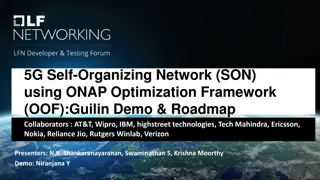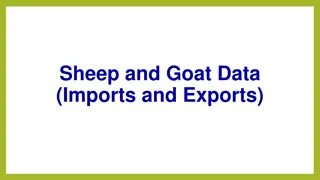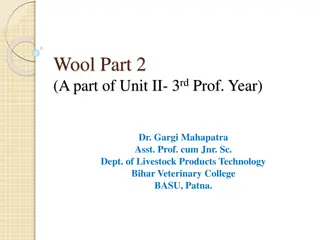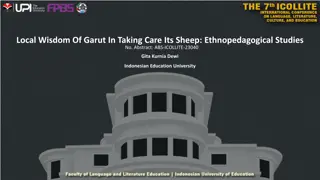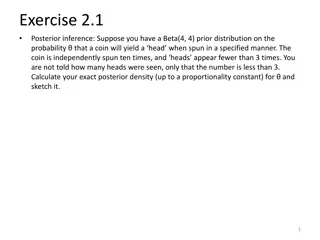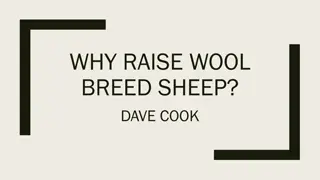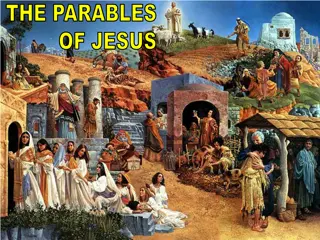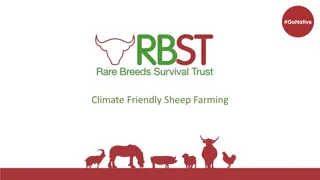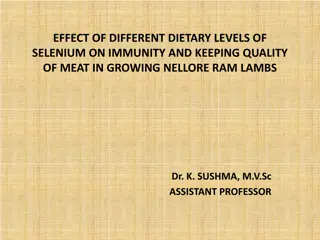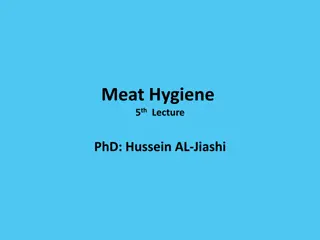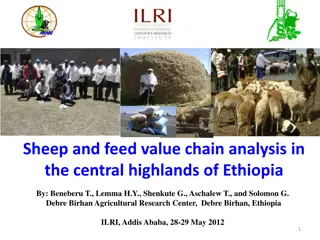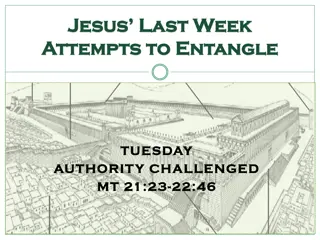Lessons from the Parables of the Lost Sheep, Coin, and Son
The parables in Luke 15 teach profound lessons about seeking the lost, God's relentless love, and the importance of repentance. Explore the significance of the shepherd's care, the woman's search, and the father's forgiveness as we delve into these timeless stories of redemption and restoration.
Download Presentation

Please find below an Image/Link to download the presentation.
The content on the website is provided AS IS for your information and personal use only. It may not be sold, licensed, or shared on other websites without obtaining consent from the author.If you encounter any issues during the download, it is possible that the publisher has removed the file from their server.
You are allowed to download the files provided on this website for personal or commercial use, subject to the condition that they are used lawfully. All files are the property of their respective owners.
The content on the website is provided AS IS for your information and personal use only. It may not be sold, licensed, or shared on other websites without obtaining consent from the author.
E N D
Presentation Transcript
Lesson 16: The Lost Sheep, Lost Coin and Lost Son &The Elder Brother Luke 15:1-32 September 15, 2021
Luke 15 Context Luke 15:1-2, Now all the publicans and sinners were drawing near unto him to hear him. And both the Pharisees and the scribes murmured, saying, This man receiveth sinners, and eateth with them. The publicans and sinners are often classified together (cf. Luke 5:30; 7:34). Jesus did not abstain from eating with them (cf. Luke 5:27-29). Pharisees and Scribes. cf. Matthew 23:23; Luke 18:9 Pharisee, means separatist
Luke 15 Context Luke 15:1-2, Now all the publicans and sinners were drawing near unto him to hear him. And both the Pharisees and the scribes murmured, saying, This man receiveth sinners, and eateth with them. Luke 5:30 Not an uncommon accusation. The Pharisees tried to persuade the general populace that Jesus credibility was destroyed by His sharing with these people. That might have been true had He never indicated His objection to what was wrong in their lives. However, see Exodus 18:1; Deuteronomy 21:20-21; 1 Corinthians 5:11; Galatians 2:12.
Lost Through Carelessness The Lost Sheep, Verses 3-7 The Shepherd: The self-righteous religious leaders placed the shepherds outside their social circles. They considered them to be ignorant, and did not regard them as worthy of special consideration. All this in spite of the fact that some of their most revered Scriptures pictured God as the Shepherd of His people, and His Messiah as a Lamb to be slaughtered (Ps. 23; Is. 40, 53; Jer. 31; Mic. 5). God had even said, I will feed My flock, and I will make them lie down, says the Lord God. I will seek what was lost and bring back what was driven away (Ezek. 34:14-15 see vv. 11-31). (C.G. Caldwell, Ezekiel, Truth Commentaries, page 830) 4
Lost Through Carelessness The Lost Sheep, Verses 3-7 Thoughtlessness. The Lost Sheep will know it is lost, but not know the way back to the fold. Absorption in other matters. Life. Luke 14:15ff Pay attention to the most important things. 5
Lost Through Carelessness The Lost Sheep, Verses 3-7 Lesson: Lack of knowledge, spiritual interest, and diligence. cf. Hosea 4:6 Give diligence 2 Timothy 2:15; Hebrews 4:11 Take heed. cf. 1 Corinthians 10:12; Hebrews 3:12 Failure to do this means we are lost. cf. Hosea 4:6; Acts 17:30. Great occasion of rejoicing when the lost sheep is found. 6
Lost Through Uselessness The Lost Coin. Verses 8-10 This coin was of no value because it was out of circulation. She has ten (deka) pieces of silver (drachmas). A drachma was a silver Greek coin comparable to the Roman denarius. Each was approximately equivalent to the value of an average day s wage for a manual laborer (Matthew 20:2). 7
Lost Through Uselessness The Lost Coin. Verses 8-10 The Lost Coin will not know it is lost and, of course, it will not know the way back to the woman s pocket. Many have changed from useful vessels into useless vessels, from vessels of honor to vessels dishonor. 2 Timothy 2:20 8
Lost Through Uselessness The Lost Coin. Verses 8-10 Lesson: Uselessness means: loss of zeal for the Lord, loss of concern for others, and loss of influence. Matthew 5:13-14 The useless member is the one who has quit. Luke 9:62 Great occasion of rejoicing when the lost coin is found. 9
Lost Through Willfulness The Prodigal Son. Verses 11-24 The Prodigal Son was lost willfully. The three characters in the parable: The merciful father. The prodigal son. The self-righteous son. The loving father distressed by the selfishness of BOTH a younger and an elder son. This story is more touching than the first two because it involves hurting human beings in family tension. 10
Lost Through Willfulness The Prodigal Son. Verses 11-24 The Prodigal Son was lost willfully. He knows he is lost and will know the way back to his father s household. He willfully asked for his inheritance. He willfully went into the far country. He willfully wasted his substance with riotous living. 11
Lost Through Willfulness The Prodigal Son. Verses 11-24 The Prodigal Son was lost willfully. Exaltation of my will and a desecration of God s will. Romans 1:18ff; Hebrews 10:26ff He was dead in sin. cf. Ephesians 2:1-2 Rebellion, stubbornness, and defiance of authority. cf. Absalom. 2 Samuel 15-18 In the pigpen. (Owner a Gentile.) The Jews could not eat pork (Isaiah 65:4; 66:17) and they did not raise hogs. Swine were unclean to them (Leviticus 11:7; Deuteronomy 14:8). 12
Lost Through Willfulness The Prodigal Son. Verses 11-24 The Prodigal Son was lost willfully. He Came To Himself! 1 John 1:8-9; Proverbs 28:13; Isaiah 59:2; Matthew 16:26-27 13
Lost Through Willfulness The Prodigal Son. Verses 11-24 NOTE THE FATHER! God s forgiveness is conditional. The father did not scold or admonish. The father made himself vulnerable. 14
Lost Through Willfulness The Prodigal Son. Verses 11-24 NOTE THE FATHER! Significance of: Clothes: The filthy robes of Joshua, the high priest, were changed for clean, rich robes before the Angel of the Lord (Zechariah 3:3-5). The angel in the tomb of Jesus wore a long white robe (stol n; Mark 16:5). Revelation 3:5, He who overcomes shall be clothed in white garments and I will not blot out his name from the Book of Life Revelation 3:18, I counsel you to buy from me gold refined in the fire, that you may be rich; and white garments, that you may be clothed. A white robe was given to each of the souls who had been slain for the word of God and for the testimony which they held. Revelation 6:11 15
Lost Through Willfulness The Prodigal Son. Verses 11-24 NOTE THE FATHER! Significance of: Ring: Servants did not wear fine rings. Only important people wore signet rings (James 2:2). Shoes: Slaves often did not wear or could not afford shoes. Fatted calf: One put up and fed for a special occasion. 16
Lost Through Willfulness The Prodigal Son. Verses 11-24 Great occasion of rejoicing when the lost son is found. When a person leaves the Lord in sin, spiritual death results (Genesis 2:17; Romans 6:23; Ephesians 2:1). He can be resurrected from that death. He can return to his Father and the Father will save him by His mercy and grace (Ephesians 2:4-10; 1 John 3:14). 17
Lost Through Bitterness The Elder Brother. Verses 25-32 The Elder Brother Was Self Commended Like the Pharisees and Scribes (Verses 1-2; Luke 18:9) He does not realize he is lost, but if he can overcome his self-righteousness he will be able to discern the way back. He was never guilty of the immoralities of his brother. 1. He had stayed in his father s house. 2. He had served his father. Lo, these many years do I serve thee. 3. Guilty of Pride, Arrogance, Self-righteous. I never transgressed a commandment, of thine. 18
Lost Through Bitterness The Elder Brother. Verses 25-32 Self Commendation Luke 14:7, And he spake a parable unto those that were bidden, when he marked how they chose out the chief seats Proverbs 25:6-7, Put not thyself forward in the presence of the king, And stand not in the place of great men: For better is it that it be said unto thee, Come up hither, Than that thou shouldest be put lower in the presence of the prince, Whom thine eyes have seen. Romans 12:3, For I say, through the grace that was given me, to every man that is among you, not to think of himself more highly than he ought to think; but so to think as to think soberly, according as God hath dealt to each man a measure of faith. Proverbs 8:13, Pride, and arrogancy, and the evil way, And the perverse mouth, do I hate. Proverbs 11:2, When pride cometh, then cometh shame Proverbs 16:18, Pride (goeth) before destruction, And a haughty spirit before a fall. 19
Lost Through Bitterness The Elder Brother. Verses 25-32 Self Commendation Lost because of his wrong attitude toward his brother. This THY son not This MY brother. He was angry, jealous, and had no sympathy for his brother. The father recognizes the elder son s faithfulness ( you are always with me ). He reassures the son that the remaining inheritance is his ( all that I have is yours ). 20
Lost Through Bitterness The Elder Brother. Verses 25-32 Bitterness to be put away. Ephesians 4:32ff Love for brethren is abundantly and plainly taught. John 13:34 The elder brother represents the Pharisees and scribes (Luke 15:1) who stood condemned because they trusted in themselves that they were righteous; and set all others at nought (Luke 18:9). 21
The Sin Of Bitterness Shimei 2 Samuel 16:5-13 Bitterness Defined: Resentment, refusing reconciliation to have bitter resentment or hatred toward someone else to be embittered, to have bitter hate. (from Greek-English Lexicon Based on Semantic Domain) Bitterness (pikria) is a spirit of resentment. It refuses reconciliation and will do nothing to initiate a restoration of good relationships. (C.G. Caldwell, Truth Commentaries)
Bitterness Generally Does Not Exist Alone Examples: Simon. Acts 8 Cain. Genesis 4 Naaman. 2 Kings 5 Elder Brother. Luke 15 Selfishness Jealousy Anger Murder Simon in Acts 8. the gall of bitterness. The word gall (chol ) was used to denote the bile (a fluid secreted by the liver) and sometimes other bitter things. Gall of bitterness that is, gall characterized by bitterness, bitter gall was an expression used to mean extreme wickedness (Thayer 509). Simon was also in the bond of iniquity that is, in the bondage of sin. Though Simon had once been forgiven of his sins, he was once again a servant of sin. Thus he would remain until he repented and prayed for forgiveness. (Truth Commentaries.)





